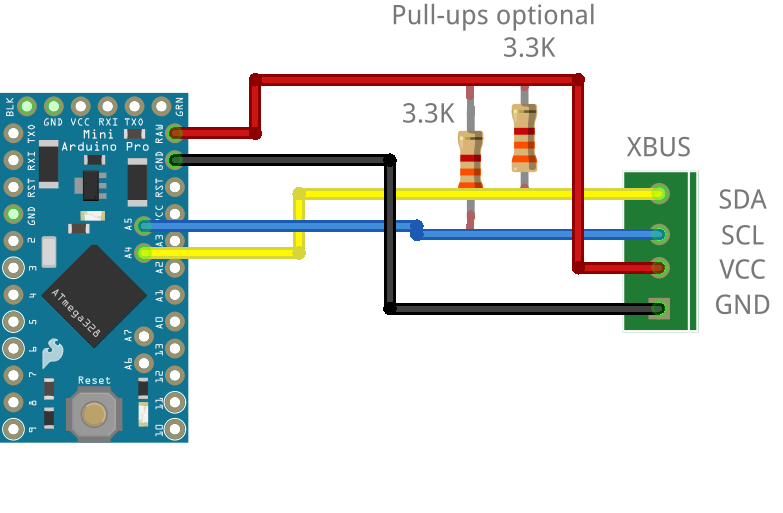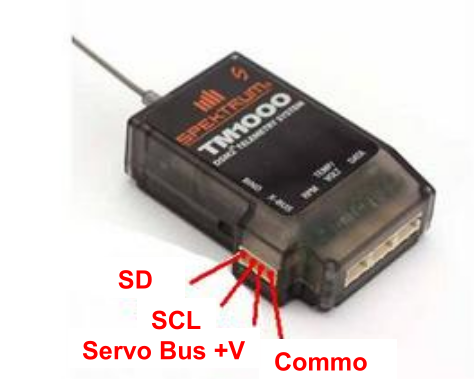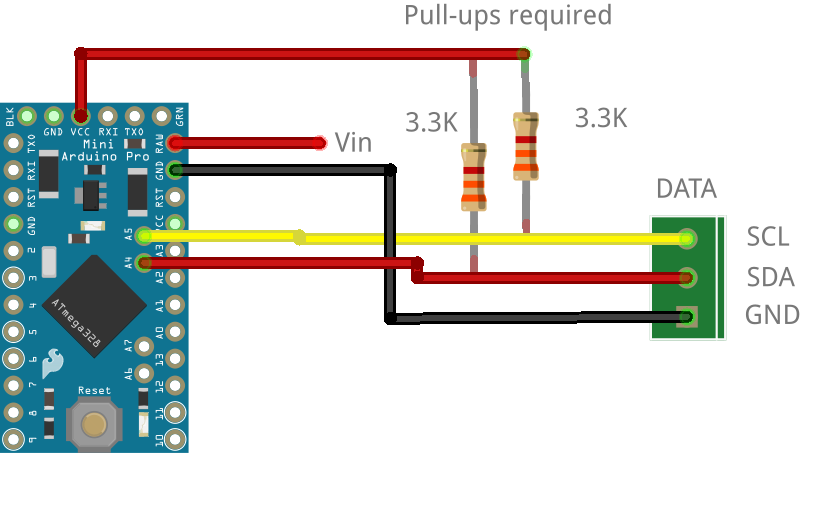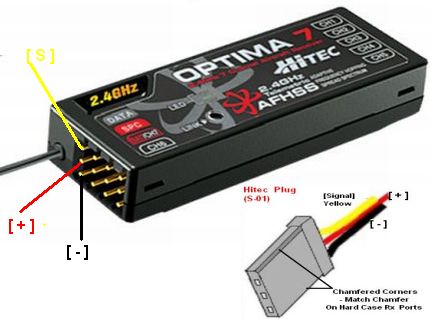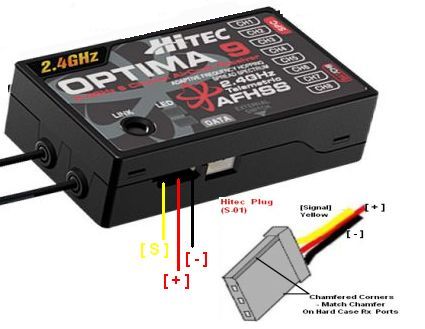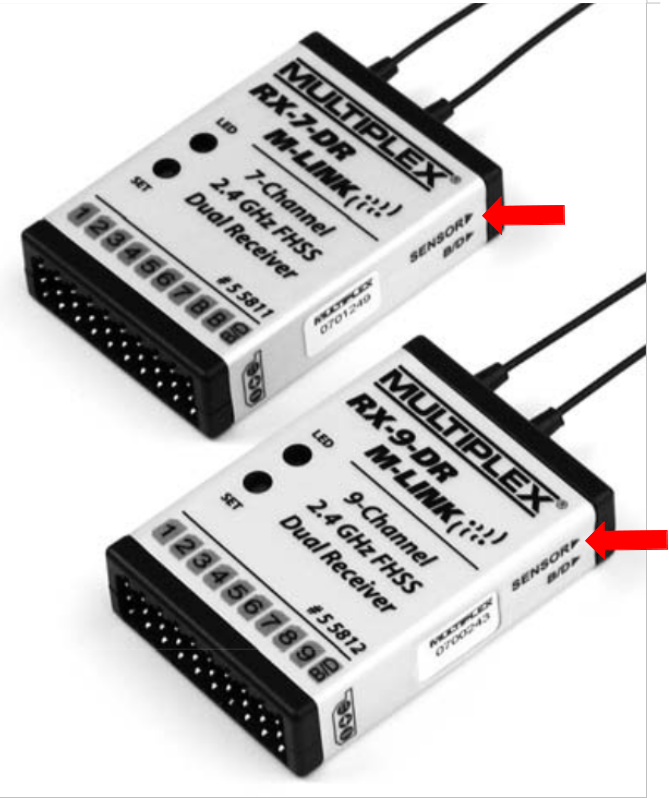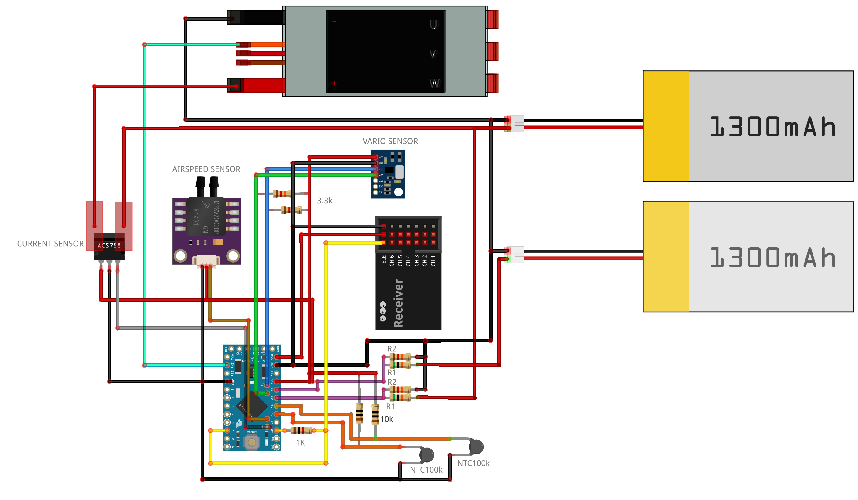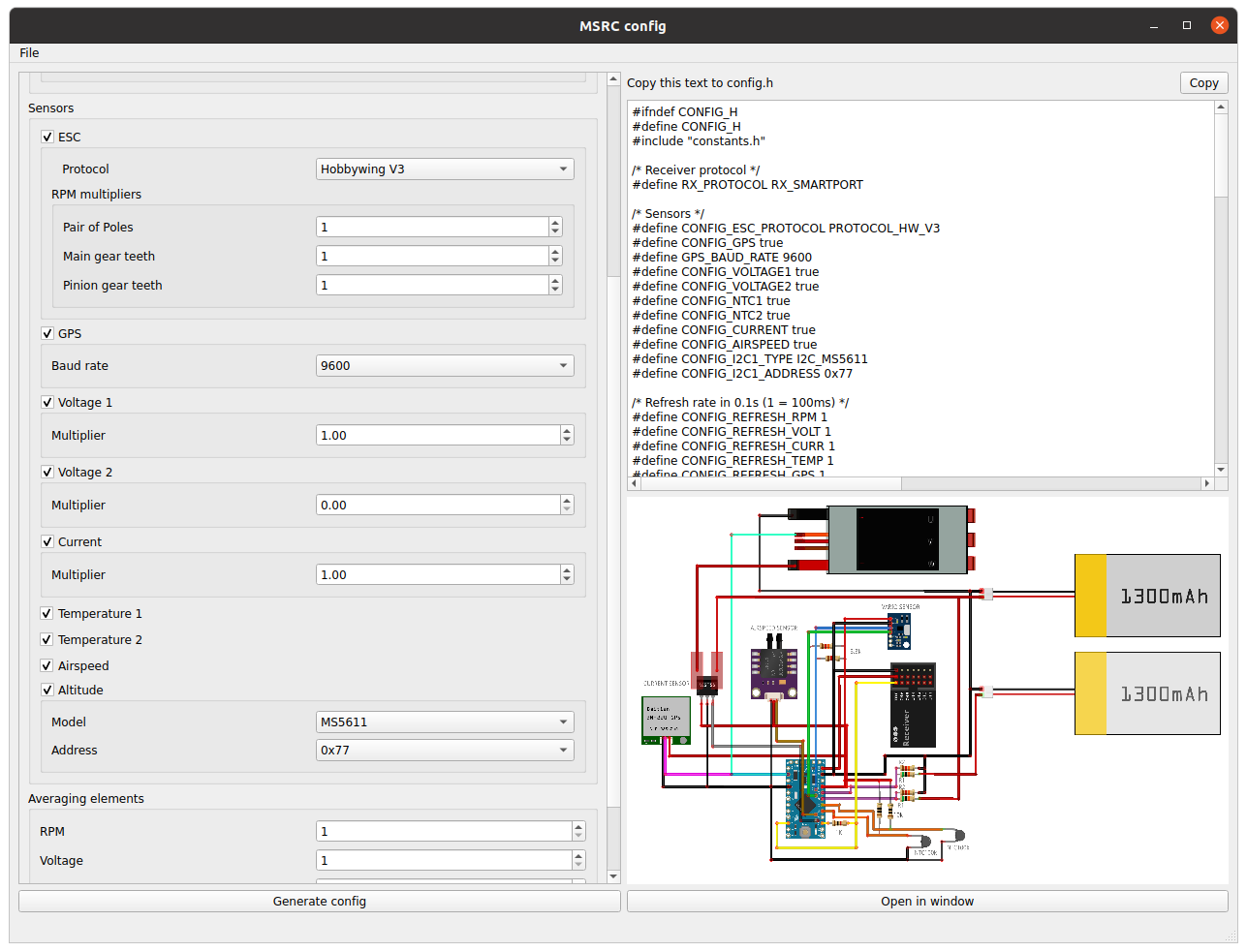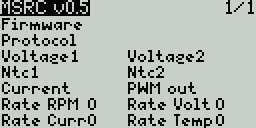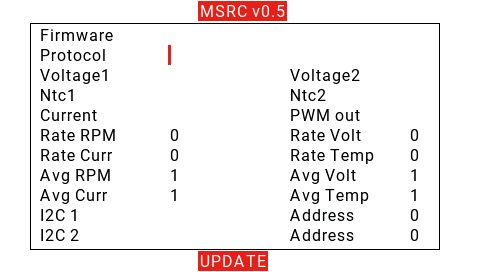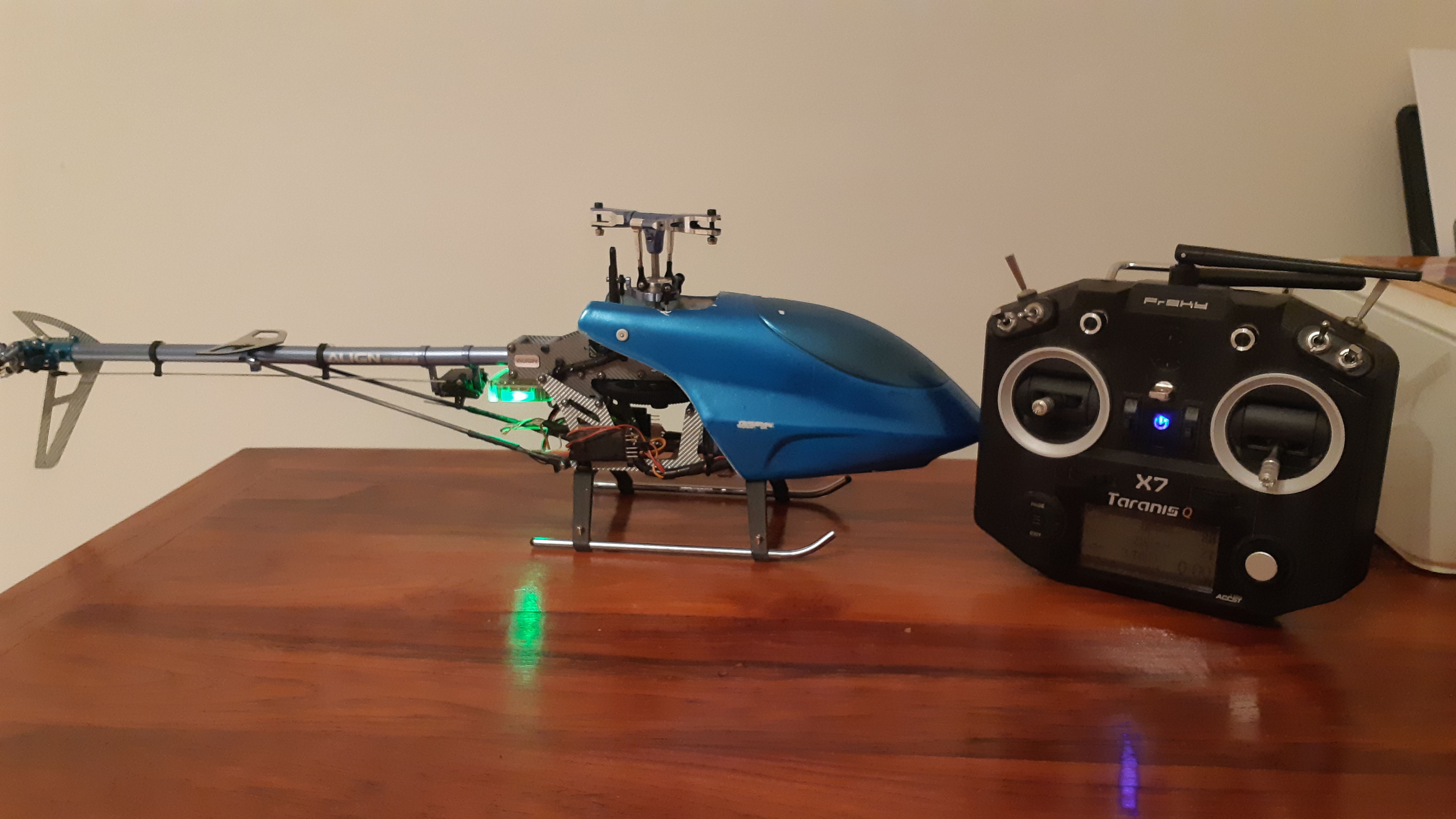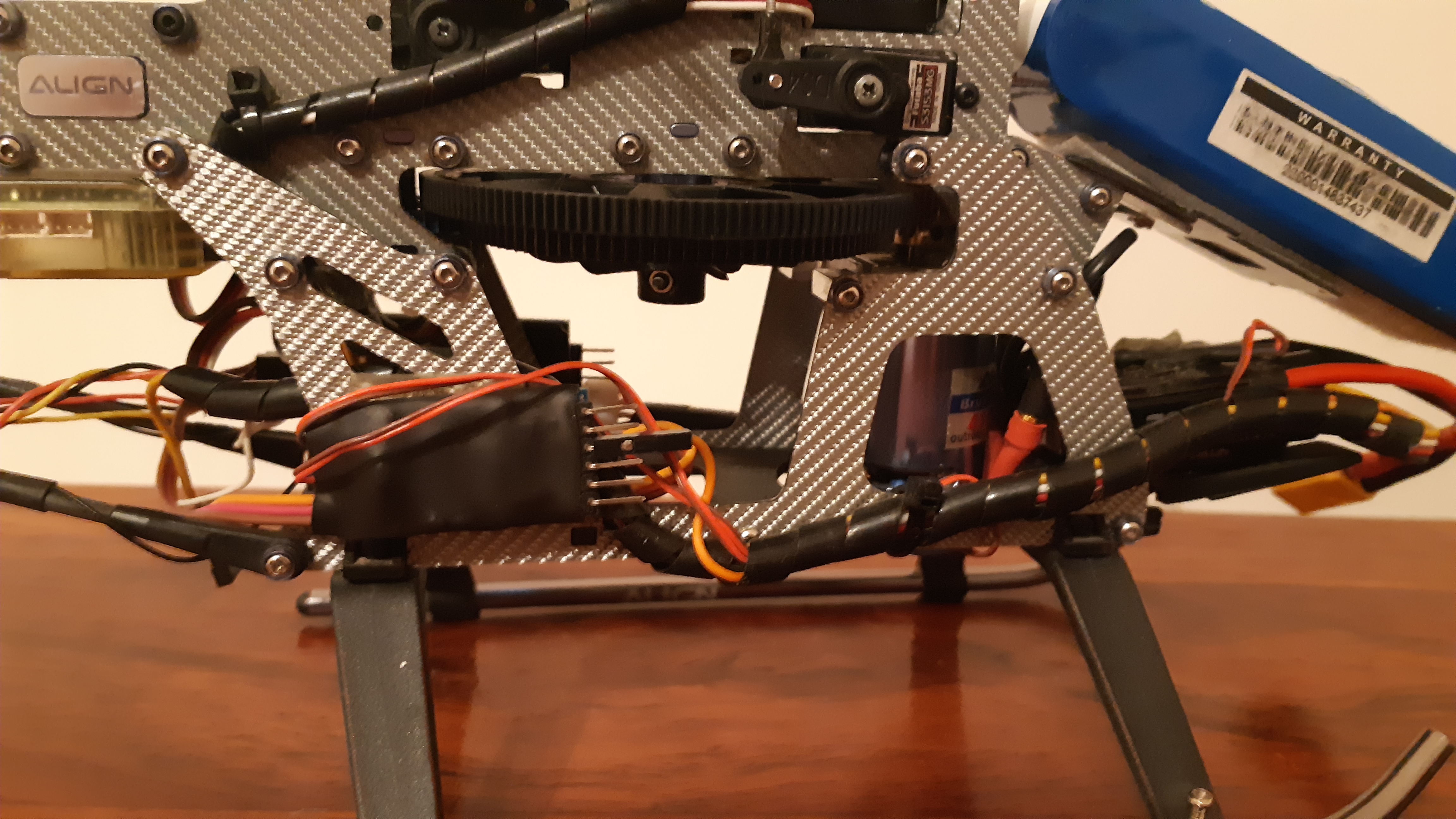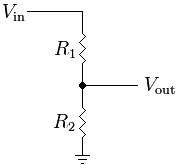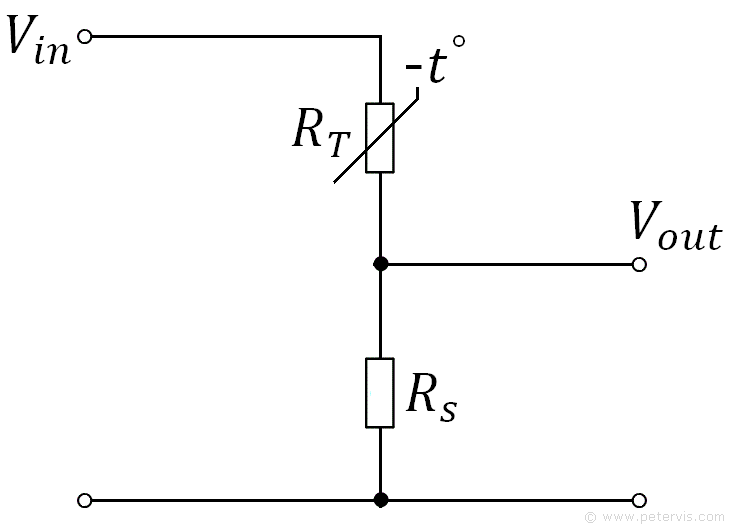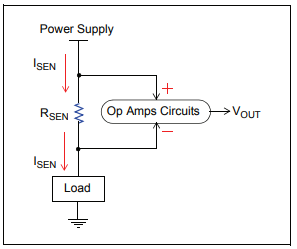MSRC - Multi Sensor for RC - Smartport, Frsky D, XBUS, SRXL, IBUS, SBUS2, Multiplex Sensor Bus, Jeti Ex Bus, Hitec
This is a DIY project to send sensors telemetry for a fraction of the weight and cost of the stock sensors. It adds support for several ESC telemetry protocols
Compatible RX protocols: Frsky Smartport, FrSky D, Spektrum XBUS, Spektrum SRXL V5, Flysky IBUS, Futaba SBUS2, Multiplex Sensor Bus, Jeti Ex Bus
Compatible ESCs: Hobbywing V3/V4/V5, Kontronik Kosmic/Kolibri/JivePro, Castle Link, APD F/HV/UHV, phase sensor/PWM signal
Compatible MCUs: ATmega328P, ATmega328PB and ATmega32U4 and Teensy LC/3.x
Implemented sensors:
- ESC
- ESCs with serial telemetry (Hobbywing V3/V4/V5(1), Kontronik(2)), APD F/HV/UHV
- ESC with PWM signal or phase sensor
- ESC Castle Link
- GPS serial (NMEA)
- I2C sensors: BMP280, MS5611
- Analog sensors: voltage, temperature, current, air speed
All sensors are optional. Make the circuit with the desired sensors and enable them in the configuration. It can be configured from the PC with msrc_gui, or with a lua script if using smartport or manually in config.h
(1) HW V5 = HW FlyFun. If ESC doesn't arm, in config.h enable ESC_INIT_DELAY or connect arduino after the ESC is armed
(2) Supported: Kosmic, Kolibri, JivePro. Not supported: Jive
| MCU | Recommended board | Castle telemetry | UART(1) | Inverted UART(2) |
|---|---|---|---|---|
| ATmega328P(3) | Arduino Pro Mini(5) | Innacurate | 1 | ❌ |
| ATmega328PB(3) | Pololu ATmega328PB(5) | ✔️ | 2 | ❌ |
| ATmega32U4(3) | Arduino Micro / Teensy 2 | ✔️ | 1 | ❌ |
| MKL26Z (ARM CortexM0+) | Teensy LC(4) | ✔️ | 3 | ✔️ |
| MK20DX (ARM CortexM4) | Teensy 3.2 | ✔️ | 3 | ✔️ |
ATmega2560 is deprecated
(1) 2 x UARTS allows to use ESC serial and GPS at the same time
(2) Allows to use hardware serial for Smartport and SBUS without signal inverter. Also is half duplex capable
(3) Arduino boards with 32kb or less and smartport, only the ESC driver defined in config.h is flashed. It can't be changed later with lua script
(4) Teensy LC is not 5v tolerant. If using with Castle is preferred Teensy 3.2, which is 5v tolerant
(5) Arduino Pro Mini and Pololu ATmega328PB requires a USB-TTL programmer for flashing
Which board should I choose?
Board required if using:
- ESC Castle: Teensy2, Micro, Pololu ATmega328PB or Teensy LC
- Receiver serial with ESC serial and GPS serial: Pololu ATmega328PB, Teensy LC/3.x
Teensy LC or Pololu 328PB is recommended if using:
- SBUS or Jeti with another serial (ESC or GPS) and you don't want to loose any serial frame. Though Mini/Micro/Teensy 2 will work as well, but losing few serial frames
For the rest of the cases you can use ATmega328P boards (Pro Mini/Pro Micro/Teensy 2)
ATmega board version 3.3v or 5v: Usually 3.3v can be used and it is recommended as serial ports for receiver, ESC and GPS works at 3.3v. This also allows to power the board from the telemetry port, which is at 3.3v. Though 5v boards will work fine as well.
| Board | Arduino Pro Mini | Pololu ATmega328PB | Teensy 2 | Arduino Pro Micro | Teensy LC Teensy 3.x |
|---|---|---|---|---|---|
| MCU | ATmega328P | ATmega328PB | ATmega32U4 | ATmega32U4 | ARMCortexM0+ ARMCortexM4 |
| NTC 1 | A0 | A0 | F7 | A0 | 14 |
| NTC 2 | A1 | A1 | F6 | A1 | 15 |
| Voltage 1 | A2 | A2 | F5 | A2 | 16 |
| Voltage 2 | A3 | A3 | F4 | A3 | 17 |
| Current | A6 | A6 | B5 | A9 | 20 |
| Airspeed | A7 | A7 | D7 | A7 | 26 |
| ESC serial | RX | RX0 | D2 | RX1 | 9 |
| GPS | RX | RX1 | D2 | RX1 | 7 |
| PWM in | 8 | 8 | D4 | 4 | 6 |
| PWM out | 10 | 10 | B6 | 10 | 22 |
| Rx Castle | - | 8 | C7 | 13(9) | 16 |
| ESC Castle(1) | - | 2 & 22 | D4 & B6 | 4 & 10 | 2 & 6 |
| Frsky Smartport, SBUS | 7 & 12(2) | 7 & 9(2) | B3 & B4(2) | MISO & 8(2) |
1 |
| Frsky D | 12 | 9 | B4 | 8 | 1 |
| SRXL, IBUS, SB, Jeti Ex | RX & TX(2) or(8) 7 & 12(2) |
RX1 & TX1(2) or(6) RX0 & TX0(2) or(7) 7 & 9(2) |
D2 & D3(2) or(8) B3 & B4(2) |
RX1 & TX1(2) or(8) MISO & 8(2) |
1 |
| Hitec, XBUS or sensor SDA | A4 | A4 | D1 | 2 | 18(3) |
| Hitec, XBUS or sensor SCL | A5 | A5 | D0 | 3 | 19(3) |
| XBUS NPN clock stretch(4) | 13 | 13 | B5 | 9 | 13 |
(1) with 3.3k pull up resistor
(2) 1k resistor
(3) If using i2c_t3 library connect I2C sensor to pins 23 (SDA1) and 22 (SCL1)
(4) optional. Only if needed. If connected, enable XBUS_CLOCK_STRECH_SWITCH in config.h
(5) If using serial ESC
(6) If using GPS
(7) If using serial ESC and GPS
(8) If using serial ESC or GPS
(9) If using with Castle, use Arduino Micro. Pin 13 not available in Arduino Pro Micro
Status led of the board blinks when sending telemetry. If it doesn't blink check connections and config
The following Rx protocols are supported:
- Frsky Smartport: inverted serial, 57600 bps
- Frsky D: inverted serial, 9200 bps
- Spektrum SRXL V5: serial, 115200 bps
- Spektrum XBUS: I2C
- Flysky IBUS: serial, 115200 bps
- Futaba SBUS2: inverted serial, 100000 bps
- Multiplex Sensor Bus: serial, 38400 bps
- Jeti Ex Bus: serial 125000, 250000 bps
- Hitec: I2C
All receivers provide 3.3V at the telemetry port.
-
5V ATmega boards can be feed with 5v to 12v at RAW pin. In this case you need to connect RAW to a servo Vcc from receiver. Also connect servo GND to arduino GND pin (though board may still work if connected to 3.3v)
-
3.3V ATmega boards can be feed with 3.3v to 12v at RAW pin. In this case you can choose the telemetry port Vcc or servo Vcc to connect to RAW pin.
-
TeensyLC/3.x. You can connect 3.7v to 5.5v to LC or 3.6v to 6.0v to 3.x at pin Vin. In this case you can choose the telemetry port Vcc or servo Vcc (if BEC is less than 5.5v or 6v) to connect to Vin pin.
Consider the following generic receiver, were Tele is the telemetry port
1k resistor
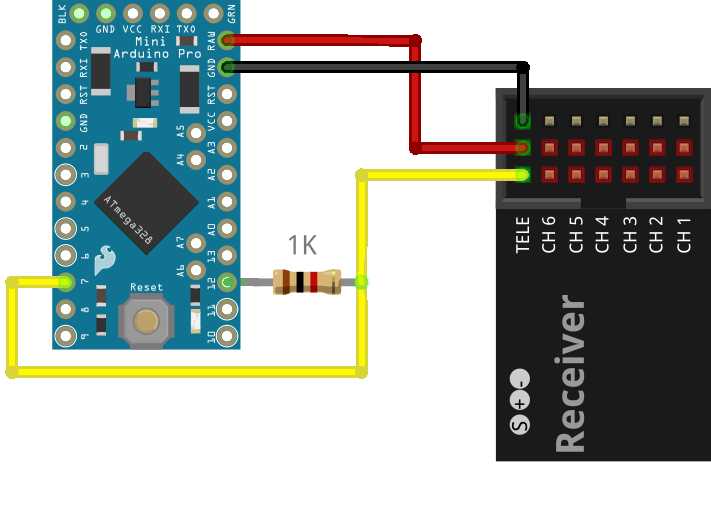
ATmega 3.3v board with inverted serial protocol (Smartport, Sbus)
ATmega 3.3v board with non inverted protocol (IBUS, M-Link, Jeti, SRXL) and ESC or GPS serial connected
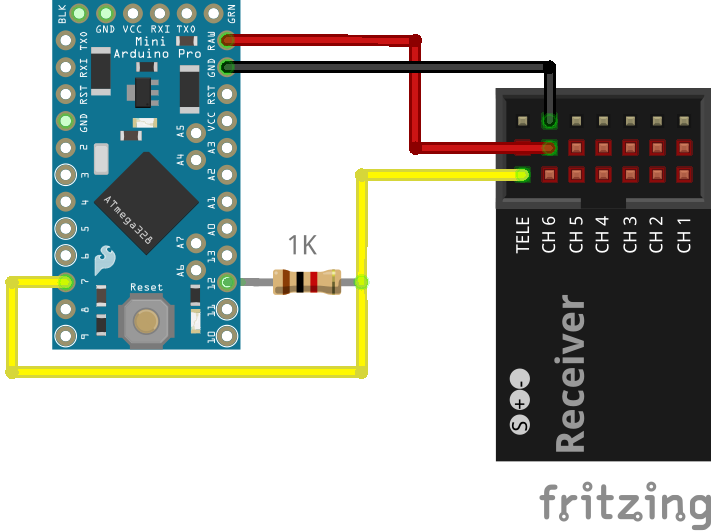
ATmega 5v board with serial inverted protocol (Smartport, Sbus)
ATmega 5v board with inverted protocol (IBUS, M-Link, Jeti, SRXL) and ESC or GPS serial connected
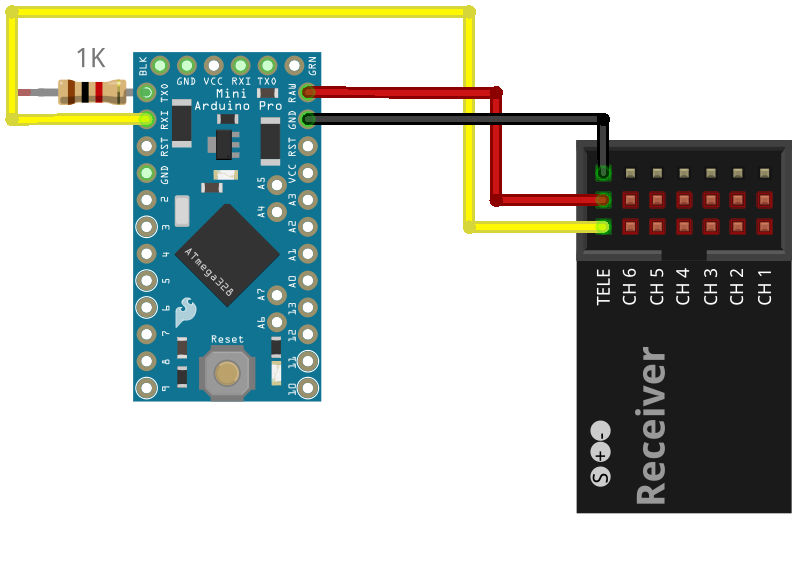
ATmega 3.3v board with non inverted protocol (IBUS, M-Link, Jeti, SRXL) and without ESC or GPS serial connected
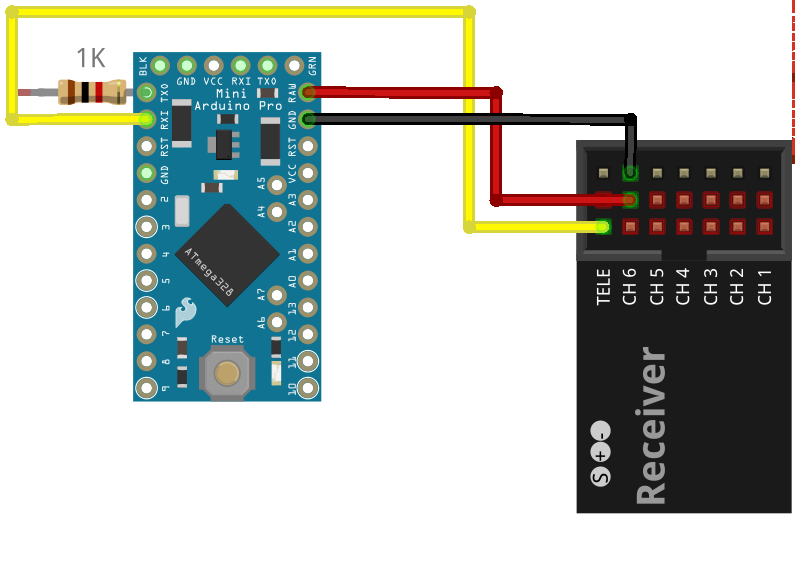
ATmega 5v board with non inverted protocol (IBUS, M-Link, Jeti, SRXL) and without ESC or GPS serial connected
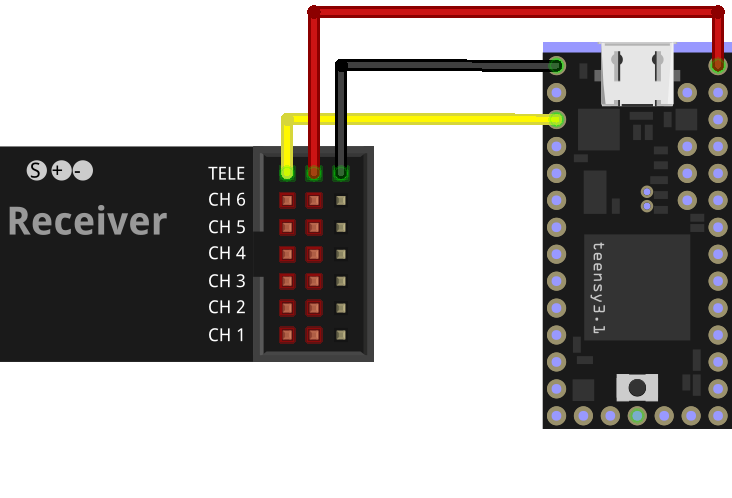
Teensy LC/3.x board any serial protocol
Slots sensor mapping for Futaba transmitters:
| Slot | Sensor |
|---|---|
| 0 | RX voltage (reserved) |
| 1 | Temperature 1 (SBS-01T/TE) |
| 2 | RPM (type magnet)(SBS-01RB/RM/RO) |
| 3-4 | Vario-F1672 |
| 6-7 | Voltage (SBS-01V) |
| 8-15 | GPS-F1675 (2) |
| 16 | Air speed (SBS-01TAS) |
| 17-23 | Unused |
| 24-26 | Current 1 (SBS-01C) |
| 27-29(2) | Current 2 (SBS-01C) |
| 30(2) | Temperature 2 (SBS-01T/TE) |
| 31 | Unused |
(1) Do not select default GPS
(2) Non default slots
Select protocol: FASSTest 18CH or T-FHSS
Connect to SBUS2 port
Auto-config may be used to detect the new sensors.
If using Teensy LC/3.1/3.5/3.6, it is feasible to use i2c_t3 library by enabling I2C_T3_TEENSY in config.h. This allows to use a second I2C port to use I2C sensors together with XBUS. Then I2C sensor to be connected to pins 23 (SDA1) and 22 (SCL1)
}It is recommended to add pullup resistors to SDA/SCL linesIf no telemetry is shown, may be MSRC is booting too slow and the first poll from the receiver is not answered. There are several ways to fix this:
- Power on the receiver after MSRC has started
- Flash MSRC without bootloader
- I2C clock stretch. Pull down the SCL line until MSRC has started, then open the switch. You can use a manual swith or a NPN transistor (e.g. PN2222ABU). If using a transistor you need to enable XBUS_CLOCK_STRECH_SWITCH in config.h to open the switch after boot. If using manual switch, open the switch after boot, to finish the clock stretch
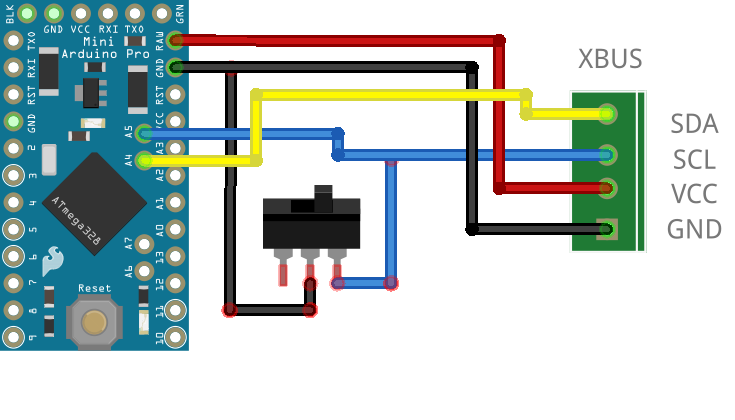
Clock stretch XBUS with manual switch
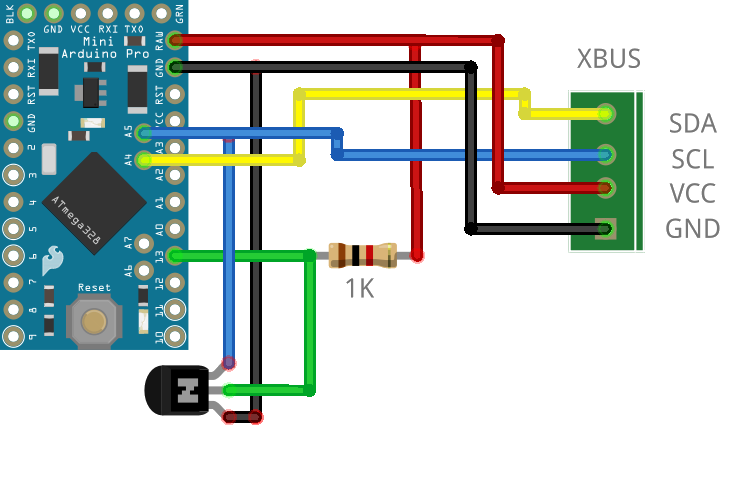
Clock stretch XBUS with transistor
If Vin is a regulated 5V source (e.g. receiver, BEC), pull ups can be connected to Vin/RAW instead Vcc. Use pull ups resistors 1k to 2.7k
Configure receiver pin (E1 or E2) as Ex Bus
Remark: Only for boards with 2k ram (ATmega328): The maximum number of sensors is 11 (e.g. GPS are already 11 sensors). You can enable the parameter JETIEX_LOW_MEMORY in jeti.h to disable less important sensors for GPS and vario. It disables Time, Date, HDOP and air temperature sensors
Compatible ESC serial protocols:
- Hobbywing V3/V4/V5. Serial 19200
- Kontronik Kosmic/Kolibri/JivePro. Serial 115200, even parity
- APD F/HV/UHV. Serial 115200
Optionally, for Hobbywing Flyfun (V5) and APD F-series, a PWM signal can be generated from the RPM telemetry value
Hobbywing Platinum V3
Telemetry port is the program port. It is a servo male plug on the ESC
Hobbywing Platinum V4 / FlyFun V5
- The telemetry port is a wired servo female plug. Don't confuse with RPM PWM signal connector or the program port
- Check firmware installed is NOT VBAR version
- Values for current when throttle is low (up to 25%, depending on model) may not be reliable. If getting high or noisy current values when throttle is low, adjust CURRENT_THRESHOLD in config.h. Below this throttle percentage (0-100%), current values will be 0A
- Set ESCHW4_CURRENT_MAX to the peak current of the ESC (eg: 80A: ESCHW4_CURRENT_MAX 100)
- Adjust ESCHW4_DIVISOR and ESCHW4_AMPGAIN, depending on model:
| Cells range | ESCHW4_DIVISOR |
|---|---|
| 3-6S (LV) | 11 |
| 3-8S (LV v2) | 15.75 |
| 5-12s (HV) | 21 |
| 6-14s (HV v2) | unknown |
| Amperage | ESCHW4_AMPGAIN |
|---|---|
| FlyFun 60A | 6 |
| FlyFun 80A | 12.4 |
| 100A | 9(1) |
| Platinum V4 120A | 10 |
| 130A | 11.3(1) |
| 150A | 12.9(1) |
| 160A | 13.7(1) |
| Platinum V4 200A | 16.9 |
(1) Extrapolated from confirmed models. If you find discrepancy adjust gain parameter and send gain and ESC model to update the table
APD F series
Telemetry port: pin T
Types of telemetry:
-
RPM output it is a PWM signal with the RPMs. Select PROTOCOL_PWM and connect to pin PWM in as noted in connections table
-
PWM telemetry. For this type of telemetry you need to flash beta firmware. It provides serial telemetry with RPMs, voltage, current and temperature. Select PROTOCOL_APD_F. Connect ESC pin T to pin Rx as defined in connections table
APD UHV/HV series
Serial telemetry with RPMs, voltage, current and temperature. Select PROTOCOL_APD_HV
If the ESC have a PWM signal or a phase sensor is installed, RPMs can be measured. If ESC have both serial and PWM signal, like Hobbywing V4/V5, then PWM signal is not needed for telemetry
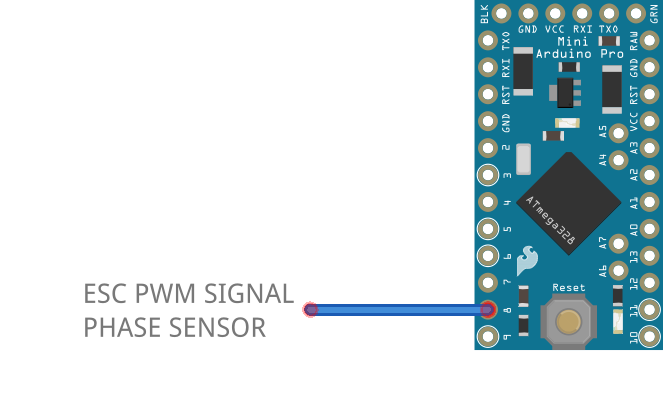
PWM signal/phase sensor circuit
The telemetry is send over the ESC signal. Castle Link has to be enabled in the ESC config
If using ATmega328P telemetry values are not accurate all the time. Some readings are increased by 5-10%. This is a hardware limitation
Remark: currently not compatible with Teensy3.x
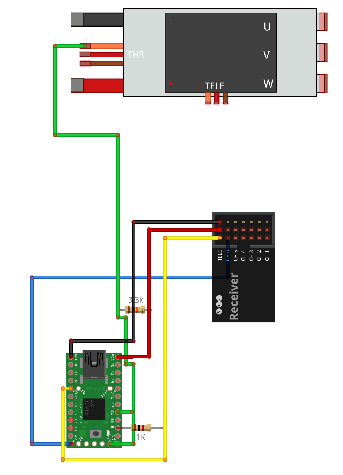
Castle Link 2 and Smartport or SBUS with Teensy
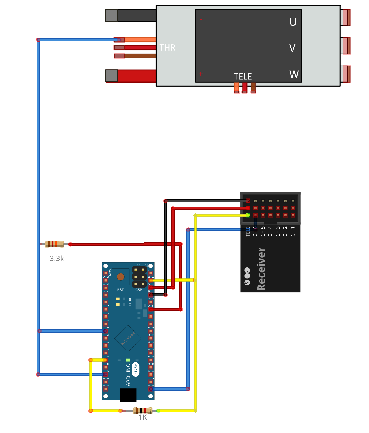
Castle Link and Smartport or SBUS with Arduino Micro
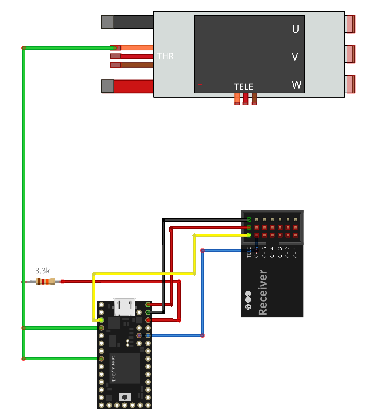
Castle Link with Teensy LC/3.x
| Model | RPM | Throttle | Motor PWM | Voltage | Current | Voltage BEC | Current BEC | Temperature 1 | Temperature 2 | Ripple Volt |
|---|---|---|---|---|---|---|---|---|---|---|
| Hobbywing V3 | ✔️ | ✔️(1) | ✔️(1) | |||||||
| Hobbywing V4/V5(4)(5) | ✔️ | ✔️(1) | ✔️(1) | ✔️ | ✔️(2) | ✔️ FET | ✔️ BEC | |||
| Castle Link | ✔️ | ✔️(1) | ✔️(1) | ✔️ | ✔️ | ✔️(3) | ✔️(3) | ✔️ | ✔️ | |
| Kontronik | ✔️ | ✔️(1) | ✔️(1) | ✔️ | ✔️ | ✔️ | ✔️ | ✔️ Power amp | ✔️ BEC | |
| APD F | ✔️ | ✔️(1) | ✔️(1) | ✔️ | ✔️ | ✔️ | ||||
| APD HV/UHV | ✔️ | ✔️(1) | ✔️(1) | ✔️ | ✔️ | ✔️ |
(1) Available but not forwarded to smartport
(2) For 80A models and higher
(3) Not available in all models
(4) Sensors varies depending on model and firmware. See annex
(5) Upgrade to latest firmware version. But note VBAR versions of firmware are not compatible. Install a non VBAR version of the ESC firmware
If voltage is available the cell voltage average is calculated for 3S,4S,5S,6S,7S,8S,10S and 12S batteries. 10 seconds after power on the number of cells is autodetected. Average cell voltage to be >3.8v for correct cell count
If current is available, battery consumption is calculated in mAh
Adjust RPMs in msrc_gui or config.h:
- Set the number of pair of poles of the motor, RPM_PAIR_OF_POLES
- For helis also set the pinion and main gear teeth: RPM_PINION_TEETH, RPM_MAIN_TEETH
Alternatively this can be done in the transmitter
Serial GPS (NMEA protocol) is supported
The following analog sensors are supported:
Calibrate voltage analog sensors with VOLTAGE1_MULTIPLIER and VOLTAGE2_MULTIPLIER in msrc_gui or in config.h. Or from opentx, but it is recommended in order to increase sensor resolution
Multiplier = (R1+R2)/ R2
No need to calibrate. For fine tuning adjust in ntc.h: NTC_R_REF, NTC_R1, NTC_BETA
Calibrate current analog sensor from msrc_gui or config.h. Or from opentx, but it is recommended in order to increase sensor resolution
Set sensor type:
-
Hall effect (ACS758, Amploc). Multiplier = 1000 / sensitivity(mV/A). Select auto-offset or set zero current output voltage (Viout), which us the voltage at current 0
-
Shunt resistor sensor. Multiplier = 1000 / (ampgain * resistor(mΩ))
No need to calibrate. For fine tuning adjust in pressure.h: TRANSFER_SLOPE,TRANSFER_VCC
The following I2C sensors are suported:
- Barometer: BMP280, MS5611
Remarks:
- For BMP280 module there are two versions: 3.3V (6 pins, I2C/SPI) and 5V (4 pins, I2C). Note that 3.3V version is not 5V tolerant. Use module version accordingly to your board Vcc
- If using XBUS, use Teensy LC/3.x to be able to use I2C sensors
Use MSRC to generate config.h. Copy and paste the text to config.h and then flash
Find the Binaries here
Or build msrc_gui:
- Install QT
- cd to msrc_gui
- qmake
- make
Manually change config.h
The configuration is modified with a lua script (X7, X9, X-lite and Horus with openTx 2.2 or higher)
Copy the file msrc.lua to the SCRIPTS/TOOLS folder. (if using older openTx 2.2 copy to SCRIPTS folder and execute by long press)
If not using lua script comment #define CONFIG_LUA and assign config values in msrc.h
Options:
- ESC protocol. HobbyWing Platinum V3, HobbyWing Platinum V4/Hobbywing Flyfun V5 or PWM signal
- Voltage1. Enable/disable analog voltage divider 1
- Voltage2. Enable/disable analog voltage divider 2
- Ntc1. Enable/disable analog thermistor 1
- Ntc2. Enable/disable analog thermistor 2
- Current. Enable/disable analog current
- Airspeed. Enable/disable analog airspeed sensor
- PWM out. Enable/disable analog a PWM signal from RPM values from ESC serial
- GPS. Enable/disable serial GPS
- Averaging queue size: 1 to 16
- Refresh rate (ms): 0 to 1600
- I2C (x2). Sensor type and address
Using Arduino IDE copy folder msrc and open msrc.ino. Select the board and flash
The default sensor id is 10. This can be changed with change_id_frsky
Depending on your configuration some the following sensors will be available in Opentx. After configuration go to sensors screen and update with Search new sensors
ESC:
- ESC RPM: Erpm (0x0b60)
- ESC voltage: EscV (0x0b50)
- ESC cell average: VFAS (0x0210)
- ESC current: EscA (0x0b50)
- ESC consumption: EscC (0x0b60)
- ESC temp FET (HW) or ESC temp linear (Castle): EscT (0x0b70)
- ESC temp BEC (HW) or ESC temp NTC (Castle): EscT (0x0b71)
- ESC ripple voltage: EscV (0x0b51)
- ESC BEC voltage: BecV (0x0e50)
- ESC BEC current: BecC (0x0e50)
Only HW V4: Sensors 5100, 5101 and 5102 contains the ESC signature and raw current. To disable, comment ESC_SIGNATURE in config.h
GPS:
- GPS Lat/Lon: GPS (0x800)
- GPS altitude: GAlt (0x820)
- GPS speed: GSpd (0x820)
- GPS compass: Hdg (0x840)
- GPS date/time: Date (0x850)
- GPS sats: 0x5103
Calculated: - Vario: 0x111
- Distance to home: 0x5104
Analog:
- Voltage 1: A3 (0x0900)
- Voltage 2: A4 (0x0910)
- Thermistor 1: Tmp1 (0x0400)
- Thermistor 2: Tmp2 (0x0410)
- Current: Curr (0x020f)
- AirSpeed: ASpd (0x0a00)
I2C:
- Altitude: Alt (0x0820)
- Temperature: T1 (0x0401, 0x0402)
Calculated: - Vario: 0x110
Some of the sensors have to be adusted in openTx
- Blades/poles: number of pair of poles * main gear teeth
- Multiplier: pinion gear teeth
Remark: Instead of adjusting the sensor in opentx, it is recommended to use VOLTAGE1_MULTIPLIER and VOLTAGE2_MULTIPLIER in config.h to increase the sensor resolution. Though voltage resolution in opentx is 10 times the current resolution, so less critical
Measure the voltage of the battery with a voltmeter and adjust Ratio in A3, A4 sensor
Remark: Instead of adjusting the sensor in opentx, it is recommended to use CURRENT_MULTIPLIER in config.h to increase the sensor resolution
If using a hall effect sensor, adjust the ratio: 25.5 x 1000 / output sensitivity (mV/A)
To calculate the battery consumption add a new sensor:
- Type: Calculated
- Formula: Consumption
- Sensor: Curr
Battery consumption is calculatd since MSRC v0.9
Alternatively can be calculated by adding a calculated sensor in openTx:
- Type: Calculated
- Formula: Consumption
- Sensor: EscA or Curr
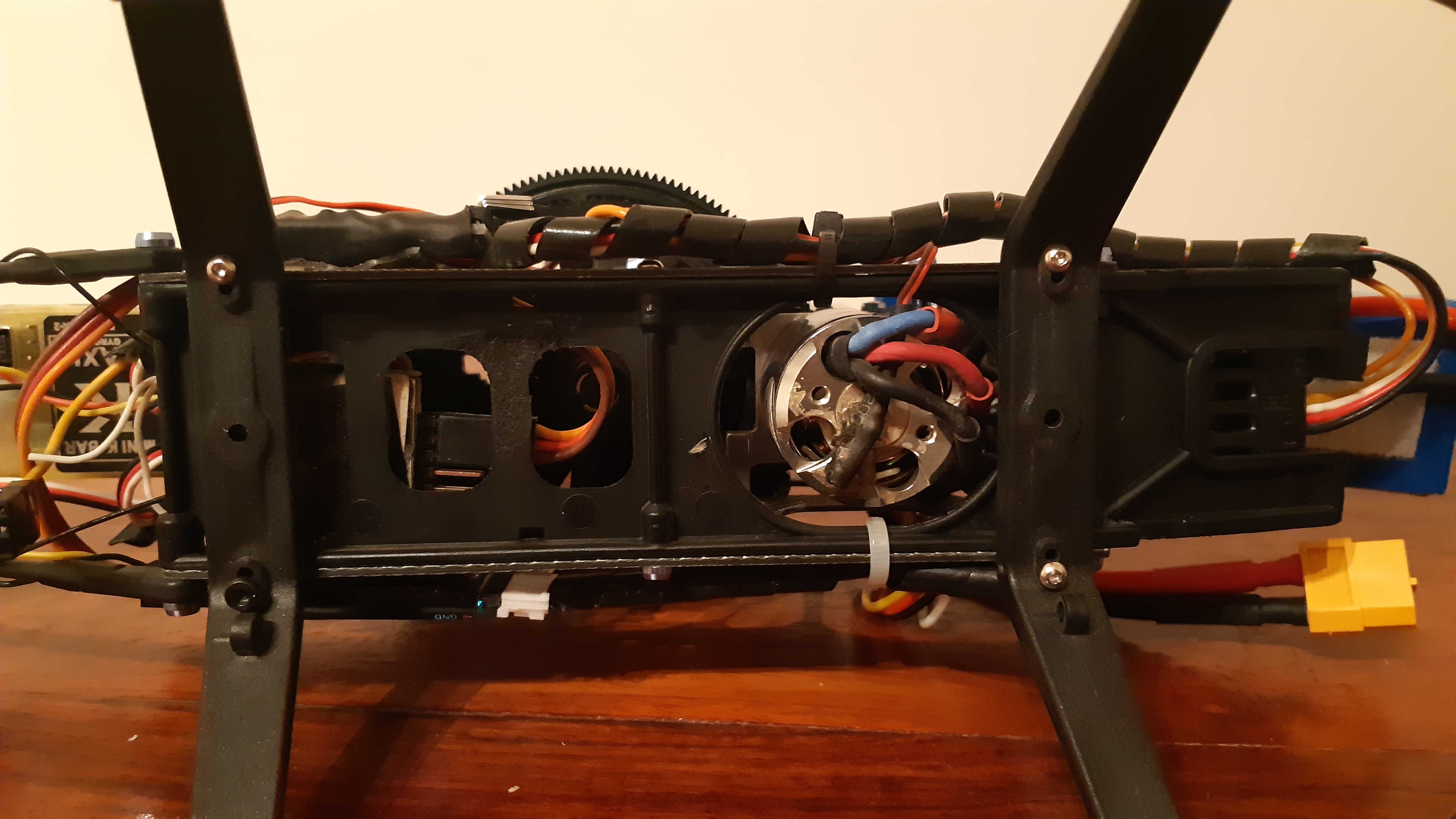

MSRC on Align 450 connected to Hobbywing V3 Platinum and two thermistors for ESC and motor
Serial parameters:
- 19200 bps
- 1 packet every 20 ms
- Big endian
| Byte | 1 | 2 | 3 | 4 | 5 | 6 | 7 | 8 | 9 | 10 |
|---|---|---|---|---|---|---|---|---|---|---|
| Value | Package Head (0x9B) | Package Number 1 | Package Number 2 | Package Number 3 | Rx Throttle 1 | Rx Throttle 2 | Output PWM 1 | Output PWM 2 | RPM Cycle 1 | RPM Cycle 2 |
RPM = 60000000 / RPM Cycle
thr, pwm: 0-255 (8bits)
| Byte | 1 | 2 | 3 | 4 | 5 | 6 | 7 | 8 | 9 | 10 | 11 | 12 | 13 | 14 | 15 | 16 | 17 | 18 | 19 |
|---|---|---|---|---|---|---|---|---|---|---|---|---|---|---|---|---|---|---|---|
| Value | Package Head (0x9B) | Package Number 1 | Package Number 2 | Package Number 3 | Rx Throttle 1 | Rx Throttle 2 | Output PWM 1 | Output PWM 2 | RPM 1 | RPM 2 | RPM 3 | Voltage 1 | Voltage 2 | Current 1 | Current 2 | TempFET 1 | TempFET 2 | Temp 1 | Temp 2 |
thr, pwm: 0-1024 (10bits)
Voltage, current and temperature are raw sensor data. Actual values requires transformation. Depending on the model, sensors are different
Before throttle is raised from 0, signature packets are sent between telemetry packets. This is used to identify the hardware and firmware of the ESC
Examples:
| Model\Byte | 1 | 2 | 3 | 4 | 5 | 6 | 7 | 8 | 9 | 10 | 11 | 12 | 13 |
|---|---|---|---|---|---|---|---|---|---|---|---|---|---|
| V4LV25/60/80A | 0x9B | 0x9B | 0x03 | 0xE8 | 0x01 | 0x08 | 0x5B | 0x00 | 0x01 | 0x00 | 0x21 | 0x21 | 0xB9 |
| V4HV200A OPTO | 0x9B | 0x9B | 0x03 | 0xE8 | 0x01 | 0x02 | 0x0D | 0x0A | 0x3D | 0x05 | 0x1E | 0x21 | 0xB9 |
| V5HV130A OPTO | 0x9B | 0x9B | 0x03 | 0xE8 | 0x01 | 0x0B | 0x41 | 0x21 | 0x44 | 0xB9 | 0x21 | 0x21 | 0xB9 |
For best accuracy RX pulse input is captured with a timer interrupt and ESC pulse output is produced by hardware PWM. Maximum latency is 20ms
See Castle Link Live
Supported models: Kosmic, Kolibri, JivePro. Protocol specs
Note that there is another protocol used by Kontronik Jive at 9600 that it is not supported. Info here
For best accuracy PWM signal output for FBL is produced by hardware PWM from serial RPM values. Maximum latency is 40ms
To obtain the voltage at the analog pin it is required the ADC bits (b) and the Vref:
Two battery voltages can be measured through the analog pins A2 and A3 Metal resistors are recommended as gives more accurate readings (0.1W or higher) Arduino can read up to 3.3V/5V and is optimized for signal inputs with 10K impedance
To select R values apply formulas:
For 6S battery (or lower) and Pro Mini 3.3v:
- R1 68k
- R2 10k
In this case ratio is 7.8
If more than 6S change R values or you may burn the Arduino!
Two temperature sensors can be installed through the analog pins A0 and A1 Temperature is measured with NTC thermistors (100k). Adjust thermistor Beta in ntc.h if needed (NTC_BETA, default is 4190). Sensor output in Celsius
To obtain the thermistor resistance:
And temperature with Beta formula:
Or with Steinhart and Hart Equation if data is available:
Hall effect sensors. Induced magnetic field is transformed into voltage. They are caracterized by their sensitivity
The voltage drop in the shunt resistor is amplified by a differential amplifier to obtain Vo
Air speed is measured with a differential pressure sensor
Presssure is calculated with the sensor's transfer formula:
And the air speed using the Bernouilli formula:
After 2 seconds the sensor is calibrated to zero
Adjust constants in pressure.h:
- TRANSFER_SLOPE (B) as per sensor datasheet
- For fine tuning measure the Vcc on the sensor and adjust TRANSFER_VCC
Altitude is calculated using the barometric formula:
R = universal gas constant: 8.3144598 J/(mol·K)
g = gravitational acceleration: 9.80665 m/s2
M = molar mass of Earth's air: 0.0289644 kg/mol
L = temperature lapse rate (K/m): 6.5 C/km
T = temperature at h (K)
Po = pressure at ground (Pa)
5 seconds after boot, pressure reference, Po, is set
v0.9
- HW V4/V5. Added throttle threshold and maximum current filters for current sensor. Values for current when throttle is low may not be reliable, depending on model
- Added consumption calculation. Thanks MJ666
- Fixed Jeti Ex bug
- HW V4/V5. Only one HW V4/V5 protocol. Voltage and current sensor parameters to be set manually
- Added RPM multipliers. Motor poles and gears (for helis)
- Changed serial drivers timeout to microseconds for fast protocols (e.g. Jeti Ex)
- Allow additional Rx protocols & boards to be used with serial ESC and GPS. Use software serial only for Rx protocols, not sensors
- GPS. Added HDOP, sats, vario and distance to home
- IBUS. Fixed S32 type bug (GPS values)
- XBUS. Added analog voltage2/ntc2 sensor
- BMP280 and GPS. Added vertical speed calculation (vario)
- Current analog. Added consumption
- Added ESC support for APD F/HV/UHV
- Added Hitec protocol
- Fixed Futaba SBUS2
- Fixed Pololu compilation in Arduino IDE
- Improved msrc_gui
- Added support for MS5611
- Added specific drivers for hardware serial and software serial
- Added msrc_gui to create config.h (not all options are avaiable from gui)
- Added Rx protocols: Frsky D, Spektrum XBUS, Spektrum SRXL V5, Flysky Ibus, Futaba SBUS2, Multiplex Sensor Bus, Jeti Ex Bus
- Added support for ATmega328PB, ATmega2560, ATmega32U4, ARM Cortex M0+ and ARM Cortex M4
- Improved accuracy for PWM input (rpm) measurement
- Added ESCs support for: Kontronik Kosmic/Kolibri/JivePro
- Improved current calculation for HW V4/V5
- Added analog airspeed sensor (MPXV7002)
- Fixed Castle Link bug
- Removed BMP180
- Fixed flickering in color lcd displays
- Added GPS serial (BN220, BN880, NEO-M8N,...)
- Added Castle Link Live protocol
- Hobbywing V4/V5. Improved transformations for voltage and current depending on the model (thanks to Commodore8888)
- Fix Horus display
- Changed R3 resistor to 3.3k
- Support for change_id_frsky to change the sensor id
- Support for I2C sensors
- Improved code quality and performance
- Smartport_library improved performance and abstract from the smartport protocol
- Added cell voltage average (HW V4/V5, VFAS sensor)
- Applied correct transformation for esc voltage, current and temperature (HW V4/V5)
- Changed averaging type from SMA to EMA
- Added esc protocol NONE
- Smartport protocol. Minor improvements
- Esc current sensor (EscA) added (HW V4/V5, 80A or higher)
- Averaging telemetry added
- Voltage2 sensor changed from A3 to A4
- Ntc2 sensor changed from Tmp1 to Tmp2
- Averaging governor added
- Refresh rate and averaging added to lua config script
For issues use github:
For questions use the forums:
If you want to add support for new receiver protocol or new sensor, ask for it
- Commodore8888 (Helifreak)
- MikeJ (Helifreak)

